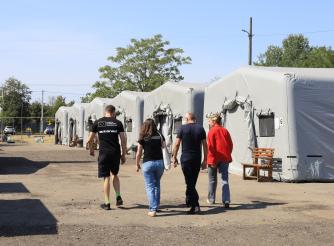"It’s an unprecedented catastrophe”: As fierce attacks continue on Rafah and nowhere in Gaza is safe, the world must act now

Attacks on Gaza have reached an unprecedented scale and intensity in recent days as the invasion of Rafah continues, deepening what was already a catastrophic humanitarian crisis.
The Israeli military is pressing on with its ground invasion of Rafah in flagrant disregard of the binding ICJ ruling issued on Friday (May 24), which ordered it to halt its offensive in the city. Following a devastating airstrike on a tent encampment on Sunday which killed 45 people, bombs have continued to rain down and tanks have now reached the city centre.
Around a million people have fled Rafah in the last three weeks alone, according to UNRWA, but there is nowhere safe for them to go as even areas designated as ‘humanitarian zones’ come under deadly attack. On Tuesday, an Israeli airstrike reportedly killed 21 people – at least 12 of whom were women – in Al-Mawasi in Western Rafah, an area people were told to evacuate to. Fatal airstrikes have also been reported around Deir Al-Balah and in Khan Younis in recent days, the two main so-called safe areas where people fleeing Rafah have travelled to.
Amjad Al Shawa, director of the Palestinian NGOs Network (PNGO), an umbrella organisation of 30 Palestinian NGOs and a partner of ActionAid Palestine, said in a voice note message: “We have these attacks on different areas, [such as] Al Mawasi which was considered as a safe place...This is [a] serious situation. Since the beginning of this war, we didn't witness such escalation on all levels. It has serious implications on the lives of people who are now in very critical conditions due to the shortage of humanitarian aid.”
Hundreds of thousands of displaced people are now packed into hugely overcrowded areas which are rapidly running out of supplies, including fuel which is vitally needed to keep sewage, waste disposal and water plants functioning.
Amjad, who fled from Rafah earlier in May, said: “The shortage of fuel affects the municipality services to collect [and treat] sewage and collect rubbish from the streets and between the shelters which [are] now overcrowded with the new [internally displaced people]. The untreated sewage channels [are now] between the tents, which is a serious concern for the people who are living in these plastic or cloth tents. It has serious implications on the health situation and we have concerns regarding the contagious diseases. The fuel effects the water operations to produce water for daily use and for [the] desalination plant to produce drinking water. The number of people increased and the water facilities cannot function well to deal with this big number because of the fuel shortage. It’s an unprecedented catastrophe.”
Supplies of fuel, food, water and medicines are urgently needed but, since early May, aid delivery to the south of Gaza has been severely disrupted and UNRWA has announced the near total collapse of its service delivery following the ground invasion of Rafah. The Rafah crossing has been closed since May 7 and while the Karm Abu Salem (Kerem Shalom) crossing has reopened, it is extremely dangerous for aid workers inside of Gaza to reach due to the ongoing military activity around it. According to UNRWA, only around 200 trucks of aid were picked up in southern Gaza in the last three weeks – a fraction of the estimated 500 to 600 trucks the UN says are needed each day in Gaza at a minimum.
As aid slows to a trickle, Gaza’s hunger crisis is deepening. A recent monitoring survey found that children’s diets in Gaza had worsened in May, with 95% of children eating less than two different food groups per day. It also found that 85% of children had gone an entire day without eating at least once during the three days prior to the survey, UNOCHA reports.
The situation is critical: the international community must act now to prevent further slaughter in Rafah and elsewhere in Gaza and uphold international law. States must apply maximum pressure on the Israeli government to change course by stopping arms sales and imposing sanctions immediately. All aid crossings must be reopened and the safety of humanitarian workers guaranteed if there is to be any hope of staving off approaching famine.
Riham Jafari, Communications and Advocacy Coordinator at ActionAid Palestine, said: "The last few days have been utterly harrowing. Our colleagues and partners in Gaza are at a total loss as to what they can do and where they can go, when death surrounds them everywhere they turn and nowhere is safe.
“The Israeli military has shown total disregard by ignoring the binding ruling from the UN’s top court and pursuing its deadly invasion of Rafah. It must be held accountable for the horrific attack there on Sunday night and other atrocities since and pressured to stop its offensive. Words of condemnation are not enough, states must take bold action now.
“Yet again, we call for an end to this nightmare and for a permanent ceasefire now."
Contact the ActionAid press office on media-enquiries@actionaid.org or on +263776665065.


